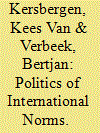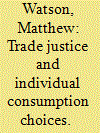|
|
|
Sort Order |
|
|
|
Items / Page
|
|
|
|
|
|
|
| Srl | Item |
| 1 |
ID:
077417


|
|
|
|
|
| Publication |
2007.
|
| Summary/Abstract |
International Relations benefits from historical comparative research. Although a historical comparative method can be fruitfully applied to the study of the European Union (EU), it is rarely undertaken. In this article, EU accession politics, particularly its 2004 enlargement, is compared with 19th century `standards of civilization' developed by European states concluding treaties with non-European nations. This article argues that EU accession politics operates in the legacies of 19th-century imperial rule. Understanding the EU in terms of an (new) empire might enrich the discussion of the perception and categorization of the EU as an international order.
|
|
|
|
|
|
|
|
|
|
|
|
|
|
|
|
| 2 |
ID:
077415


|
|
|
|
|
| Summary/Abstract |
International Relations benefits from historical comparative research. Although a historical comparative method can be fruitfully applied to the study of the European Union (EU), it is rarely undertaken. In this article, EU accession politics, particularly its 2004 enlargement, is compared with 19th century `standards of civilization' developed by European states concluding treaties with non-European nations. This article argues that EU accession politics operates in the legacies of 19th-century imperial rule. Understanding the EU in terms of an (new) empire might enrich the discussion of the perception and categorization of the EU as an international order.
|
|
|
|
|
|
|
|
|
|
|
|
|
|
|
|
| 3 |
ID:
077413


|
|
|
|
|
| Publication |
2007.
|
| Summary/Abstract |
Social and economic policy decisions are increasingly being taken in a global public domain in which national/transnational boundaries are blurred, and the `public' domain includes non-state actors. We argue that a new rights advocacy, advancing economic and social human rights as well as civil and political, is essential to understanding rule-making in the global public domain. New rights advocacy involves traditional human rights and development NGOs, social movement organizations and new `hybrid' organizations, in using human rights standards and methods to influence states, international organizations, and corporations. The new patterns of NGO engagement are studied through case studies of advocacy on HIV/AIDS and on the right to water. New rights advocacy constitutes a direct challenge to development orthodoxy, suggests a new interpretation of the social movements protesting globalization, and manifests a complex relationship between NGOs and poor country governments, in which NGOs often advocate on behalf of these governments' sovereign rights to set economic and social policy.
|
|
|
|
|
|
|
|
|
|
|
|
|
|
|
|
| 4 |
ID:
077414


|
|
|
|
|
| Publication |
2007.
|
| Summary/Abstract |
Theories on the role of norms in international relations generally neglect the possibility that after their adoption a new battle over their precise meaning ensues, especially when a norm remains vague and illusive. Norm implementation is not only a matter of internalization and compliance, but also of redefinition. Building on insights from rationalist and constructivist approaches, this article advances the idea of recurrent battles for and over norms in international politics. It argues that the analytical tools of international regime theory are instrumental in tracking such battles. This framework is applied to the history and role of subsidiarity as a norm in the competence regime of the European Union between 1991 and 2005. Its main finding is that the issue of subsidiarity was not a matter of norm internalization, but concerned a recurrent battle between old and newly empowered actors over its precise meaning, eventually favouring the member states' prerogative
|
|
|
|
|
|
|
|
|
|
|
|
|
|
|
|
| 5 |
ID:
077412


|
|
|
|
|
| Publication |
2007.
|
| Summary/Abstract |
The balance of power is one of the most influential theoretical ideas in international relations, but it has not yet been tested systematically in international systems other than modern Europe and its global successor. This article is the product of a collective and multidisciplinary research effort to redress this deficiency. We report findings from eight new case studies on balancing and balancing failure in different international systems that comprise over 2000 years of international politics. Our findings are inconsistent with any theory that predicts a tendency of international systems toward balance. The factors that best account for variation between balance and hegemony within and across international systems lie outside all recent renditions of balance-of-power theory and indeed, international relations scholarship more generally. Our findings suggest a potentially productive way to reframe research on both the European and contemporary international systems.
|
|
|
|
|
|
|
|
|
|
|
|
|
|
|
|
| 6 |
ID:
077416


|
|
|
|
|
| Summary/Abstract |
International Relations benefits from historical comparative research. Although a historical comparative method can be fruitfully applied to the study of the European Union (EU), it is rarely undertaken. In this article, EU accession politics, particularly its 2004 enlargement, is compared with 19th century `standards of civilization' developed by European states concluding treaties with non-European nations. This article argues that EU accession politics operates in the legacies of 19th-century imperial rule. Understanding the EU in terms of an (new) empire might enrich the discussion of the perception and categorization of the EU as an international order.
|
|
|
|
|
|
|
|
|
|
|
|
|
|
|
|
| 7 |
ID:
077418


|
|
|
|
|
| Publication |
2007.
|
| Summary/Abstract |
A consistent theme of the existing literature is that fair trade consumption practices represent acts of justice. In this article I investigate such an equation from the perspective of the moral theory of Adam Smith. Smith explains the development of moral sensibilities via an imaginative act he calls `sympathy'. For Smith, justice prevails in interpersonal relationships in which the potential for one person to do harm to another is ruled out because their respective imaginations are in perfect accord, thus creating a situation of mutual sympathy. I advance two main conclusions. First, I argue that fair trade consumption is undoubtedly a moral act in the manner described by Smith, as it involves consumers responding to fair trade campaigns in order to trigger their moral sensibilities through exercising their imaginative faculties. Second, though, I argue that fair trade consumption is not specifically a moral act of justice in the manner described by Smith. The structure of fair trade invites the First World consumer to display sympathy for the Third World producer, but it provides no means for that sympathy to be reciprocated. As such, instances of genuine mutual sympathy do not arise. From a Smithian perspective, fair trade consumption practices are an act of beneficence rather than an act of justice. They thereby reside in the realm of private virtue rather than the realm of public duty, with significant implications for the way in which trade justice is conceptualized and studied in IPE
|
|
|
|
|
|
|
|
|
|
|
|
|
|
|
|
|
|
|
|
|